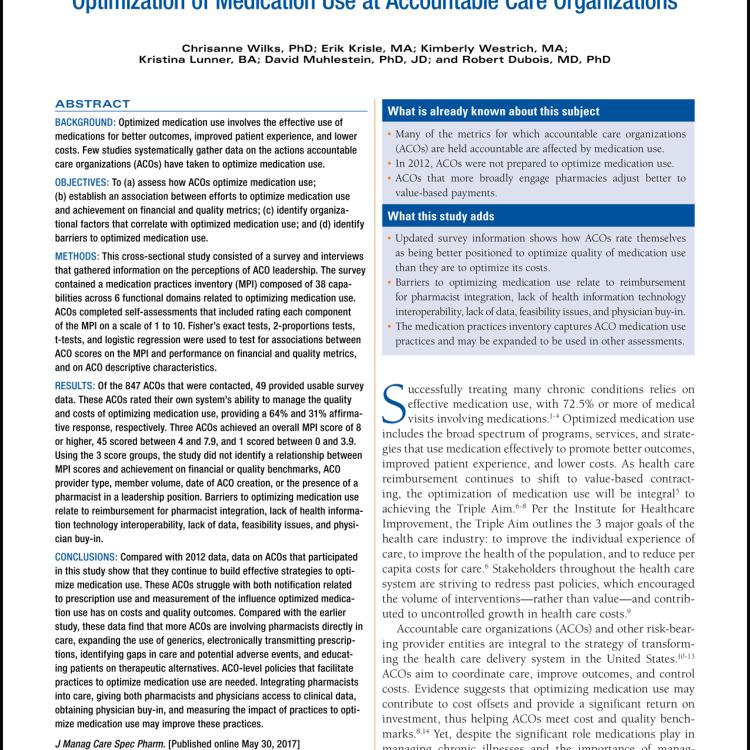Authors: Wilks C, Krisle E, Westrich K, Lunner K, Muhlestein D, Dubois R.
Publication: Journal of Managed Care & Specialty Pharmacy, October 2017
Download the infographic.
Accountable care organizations (ACOs) aim to coordinate care, improve outcomes, and manage costs. Evidence suggests that optimizing medication use may contribute to cost offsets and provide a significant return on investment, thus helping ACOs meet cost and quality benchmarks. Yet, despite the significant role medications play in managing chronic illnesses and the importance of managing chronic illness to ACO success, there has been limited investigation into how much ACOs focus on medication use.
This study, conducted with Leavitt Partners LLC, assesses: how ACOs optimize medication use, whether there is an association between efforts to optimize medication use and achievement on financial and quality metrics, organizational factors that correlate with optimized medication use, and barriers to optimized medication use. Results were gathered from a survey as well as qualitative interviews to collect information on perceptions of ACO leadership. The study builds on NPC’s previous research with the American Medical Group Association and Premier, Inc., on ACO readiness to provide updated data points on ACO success.
Compared to NPC’s previous research:
- more ACOs give themselves higher scores on educating patients about alternatives when determining the recommended medication, which is significant given that patient education is a pending Centers for Medicare and Medicaid Services metric.
- more ACOs are involving pharmacists in direct patient care, and focus on appropriate generic use has also been expanded.
- more ACOs identify and notify care providers of potential adverse events, alert providers to gaps in preventive care, and electronically transmit prescriptions for non-controlled substances than in the previous study.
Although ACOs continue to build effective strategies to optimize medication use, they still struggle with both notification related to prescription use and measurement of the influence optimized medication use has on costs and quality outcomes. The research revealed several barriers to implementing more comprehensive medication strategies at ACOs, including:
- lack of reimbursement for pharmacists’ services,
- poor technology interoperability, and
- difficulty isolating and evaluating the cost savings associated with better medication use practices.
Several forces may increase the attention that ACOs give to medication use practices, including:
- the increased number of medication-related quality metrics that CMS plans to roll out to its ACOs. The new metrics will facilitate more data collection related to medication use practices by CMS and other payers;
- the likelihood that the health care system will revisit payment for pharmacists’ services as more data show the cost savings and improved outcomes associated with the integrating pharmacists;
- reevaluation of relationships with the pharmaceutical industry (e.g., performance-based contracting) and the transformation of the health care system; and
- the potential for an easier-to-navigate pathway to optimize medication use practices once more clear data is available from within ACOs, especially data on chronic illnesses.
This research indicates medication use practices may be easier to implement if ACOs provide access to data to both pharmacists and physicians, focus on removing technological barriers, gather buy-in from frontline physicians and integrate pharmacists into care teams. Policies that remove barriers to or incentivize integration of practices to optimize medication use—and integrate pharmacists into care delivery—are likely to improve medication use in ACOs, which should enhance achievement of the “Triple Aim” of improving the individual experience of care, improving the health of the population, and reducing per capita costs for care.
